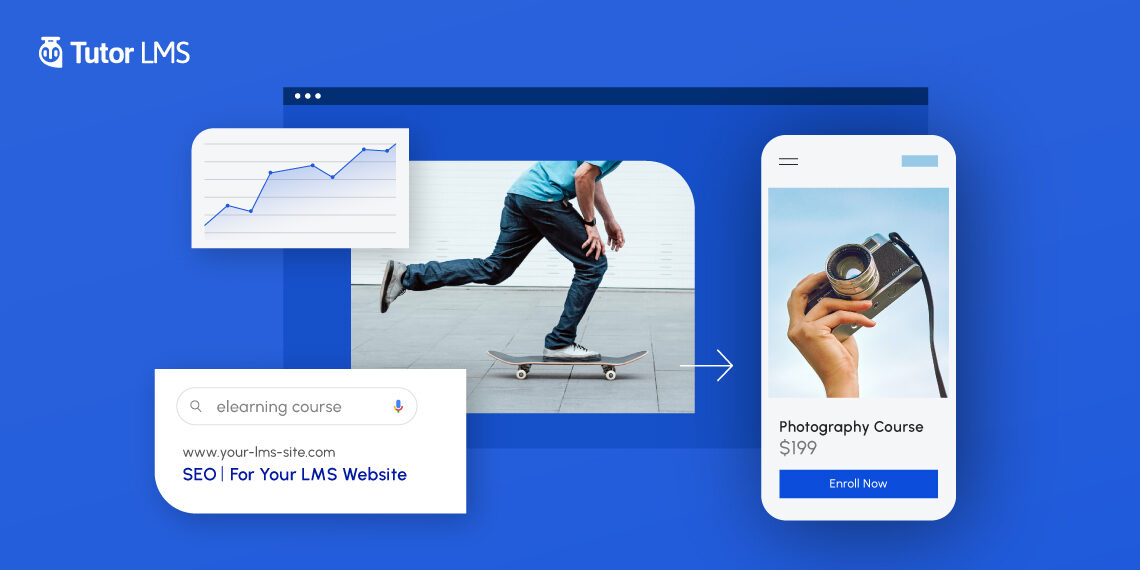Success in the eLearning industry is not as simple as putting up an online course, even if it’s spectacular. Often, newly minted courses end up being lost among thousands of others. However, if you’re hoping to avoid this fate, then there is only one solution and that is SEO.
Today, we’ll be discussing how you can optimize your LMS site & eLearning courses for SEO and become a successful edupreneur.
What Is SEO & Why You Need It
SEO stands for Search Engine Optimization and it’s an approach used to improve your LMS site’s visibility on the internet. This helps level up its rankings on SERPs and thus drive more traffic to the site.
SERPs or Search Engine Result Pages are web pages that appear when you look something up on any search engine. It is crucial to rank high on these because most users hardly ever click past the first page.
Of course, this is just one of the many benefits of SEO, and below is a list of other ways it can positively affect your LMS site:
- Helps you reach your target audience
- Boosts quality and credibility
- Makes for a better user experience
- Enhances user engagement
- Can be implemented with little to no cost
How to Optimize for SEO
In this section, you can finally discover what you’ve been waiting for and that is how to optimize your LMS site & eLearning courses for SEO.
1. Choose an SEO-friendly LMS
Choosing the right LMS goes a long way in ensuring the success and longevity of your eLearning site. Quality learning management systems should already be optimized for on-site SEO, greatly reducing your work for you. One such example is Tutor LMS, a powerful WordPress LMS plugin.
Tutor LMS is designed with SEO friendliness and ease of use in mind. Using this, you can effortlessly create engaging courses, quizzes, and assignments. Not to mention, the tons of amazing add-on features you will have at your fingertips. Tutor LMS is also compatible with various SEO-focused themes which will further help you to optimize your site for SEO. We personally recommend Tutor Starter, a theme designed especially for Tutor LMS and it boasts a modern and unified design.
WordPress is also home to popular SEO plugins like Yoast SEO and RankMath which you can use in collaboration with Tutor LMS. With Yoast SEO and/or Rank Math enabled, you can do the following:
- Connect with Rank Math AI
- Add Meta Title & Description to your site
- Analyze text readability and calculate the SEO score
- Get related link suggestions
- Check the use of keywords, presence of links, and more.
2. Enhance Your Course Content
Before doing anything else, you need to ensure the quality of your courses. Prospective students should find their content to be accessible and engaging. You can do this in many ways but the most important one is by explaining concepts easily.
Simple explanations are a student’s best friend and that’s what most look for in a course. But explaining simply doesn’t mean that you can’t explain in detail. Elaboration is actually helpful to students but it is best to split up lessons that get too long.
Another way to engage students is to conduct live sessions which are way more interactive and effective compared to text or video-based formats. You can also adopt gamification strategies and other tools to enhance your course even further.
3. Produce Quality Edublogs
Blogs are a powerful tool and you can use them to reach out to specific target audiences. If written well, they can not only grab your audience’s attention but also convince them to explore further. However, doing this willy-nilly will not give you the same results so let us go over some tips to keep in mind.
First and foremost, you have to make sure you’re putting out the content that is relevant to your LMS site, specifically focusing on what your target audience is looking for. This can be done using the help of Keyword Research. Targeting frequently searched keywords can help you drive more traffic to your site.
Of course, short keywords have high competition so it is best to focus on longer and more specific phrases. Keyphrases have the added benefit of being low cost while boasting a higher conversion rate. Once you’ve selected a keyphrase, be sure to mention it in your article a few times while still maintaining its readability. Duplicate content is also a big no-no for most search engines so be sure to avoid that.
Secondly, come up with a title that sticks. More often than not, readers will simply read the title and skip so it is something that needs to grab their attention to keep reading. Also, your target keyphrase needs to be part of this title, preferably in the beginning.
Next, use relevant images and videos in your article because blogs containing them get 94% more views! Don’t forget to add relevant alt text to improve your SEO and accessibility. Last but not the least, make sure to add a Meta Title and Description.
These two details are what appear on SERPs so they need to be impactful and must contain the keyphrase as well. You should make your meta titles 50-60 characters long and meta descriptions should be within 120-160 characters. Note that keeping it on the shorter side works best for phones.
4. Boost Your Technical SEO
Technical SEO is website and server optimizations that help search engines crawl and index your site better and more efficiently. To improve your technical SEO you must have:
- Faster Page Speed: A fast-loading website is an important ranking factor for search engines.
- An SSL Certificate: SSL certificates are a security technology that helps keep sensitive data encrypted over the internet.
- A Mobile-First Website: A major percentage of the traffic on the internet is conducted on smartphones thus search engines prioritize mobile-friendly sites.
SEO Tools to Make Your Life Easier

With the assistance of various SEO tools, the process of keyword research and maintaining a good SEO score is more efficient and reliable. Some popular keyword research tools are:
- Ahrefs.com
- Ubersuggest
- Answer the Public
These tools list the search results, search volume, keyword difficulty, the average CPC, and more.
Another nifty tool is Page Speed Insights. This tool gives a detailed analysis report on the performance of any given page on both mobile and desktop devices. It contains metrics like FCP, FID, LCP & CLS, and all of them are displayed on a scale from good to poor. It also provides you with the Lighthouse performance score, lists possible opportunities for improvement, and identifies issues under the diagnostics section
Some other notable SEO tools include:
- SEO Analysis & Website Review
- Animalz Revive
- Can I Rank
- Yoast SEO Plugin
- BuzzSumo
- Coschedule Headline Analyzer
Of course, there are many more tools out there but these were the ones that piqued our interest and seemed useful.
Get the Reach You Desire
With these strategies and tools in place, optimizing your LMS site & eLearning courses for SEO is going to be a much more straightforward endeavor. While SEO is a long-term commitment, you will reap its rewards for years to come.
All in all, we hope you found this article helpful, and if you have any suggestions or queries feel free to comment to us below. Until next time, ciao!



